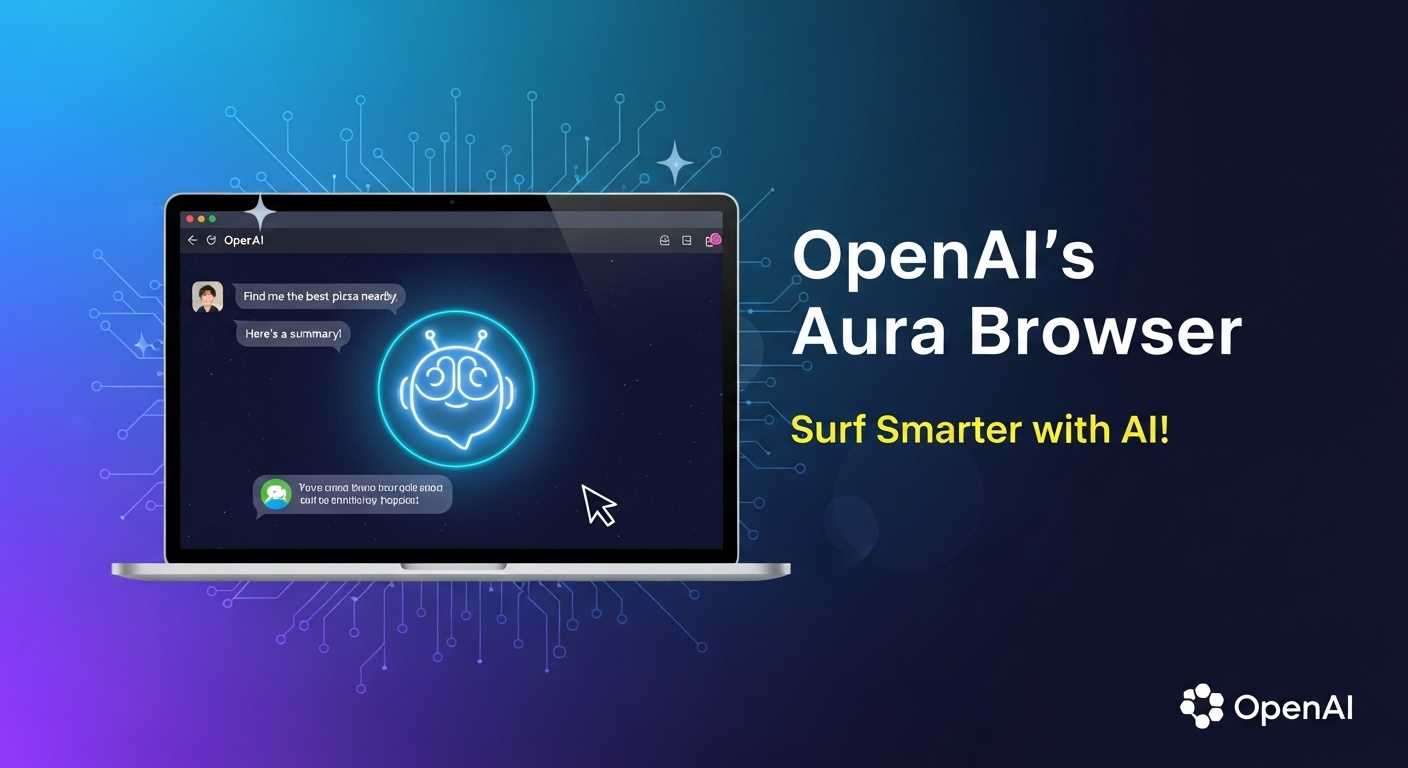OpenAI’s AI-Powered Web Browser: A New Way to Surf the Internet

OpenAI, the company behind ChatGPT, is about to launch a new web browser that uses artificial intelligence (AI) to change how we explore the internet. This browser, codenamed Aura, aims to make browsing faster, smarter, and more personal. Unlike traditional browsers like Google Chrome or Safari, this one will use AI to help users with tasks, answer questions, and even reduce the need to visit multiple websites. This article dives into what makes this browser unique, its potential benefits, and what it means for the future of the internet.
This section introduces OpenAI’s new browser, explaining its purpose and how it stands out from others. It sets the stage for a deeper look at its features, benefits, challenges, and impact.
What Makes Aura Different?
OpenAI’s browser, built on Google’s open-source Chromium engine, is designed to integrate AI directly into the browsing experience. Instead of just opening web pages, it offers a chat-like interface similar to ChatGPT. Users can ask questions or give commands, and the browser’s AI, called Operator, can perform tasks like booking tickets or filling out forms. This makes browsing feel more like talking to a smart assistant.
Key Features of Aura
- Chat-Based Navigation: Users can type or speak queries, and the AI responds with answers or actions without needing to visit multiple sites.
- Task Automation: The Operator AI can handle tasks like scheduling appointments or summarizing web content.
- Personalized Experience: The browser learns user preferences to offer tailored suggestions and shortcuts.
- Chromium Foundation: Built on the same tech as Chrome, it ensures compatibility with most websites and extensions.
Pros and Cons of Aura
| Pros | Cons |
|---|---|
| Saves time with AI automation | May raise privacy concerns due to data collection |
| Simplifies browsing with chat interface | Could reduce traffic to smaller websites |
| Works with most websites via Chromium | Faces tough competition from Chrome and Safari |
This section explains Aura’s unique AI-driven features and how they differ from traditional browsers. It uses a table to clearly compare benefits and drawbacks, making it easy for young readers to understand.
Why OpenAI Is Building a Browser
OpenAI wants to make the internet easier to use while competing with giants like Google. By creating Aura, they aim to capture user data to improve their AI models, much like Google does with Chrome. This data helps the AI understand user habits and offer better services. OpenAI also hired two former Google Chrome developers, showing they’re serious about challenging the market leader.
A Personal Anecdote
When I was 14, I spent hours searching for information on websites for school projects. It was frustrating to click through endless links. A browser like Aura could have saved me time by summarizing information or finding exactly what I needed with one question. This kind of innovation feels like a game-changer for students and busy people alike.
Strategic Goals
- Compete with Google: OpenAI wants to challenge Chrome’s 68% market share by offering a smarter alternative.
- Data for AI Growth: User data will help improve ChatGPT and other OpenAI tools.
- New User Experience: Aura aims to make browsing feel like a conversation, not just clicking links.
This section covers OpenAI’s motivations and includes a personal story to connect with young readers. It explains why data matters and how Aura fits into OpenAI’s bigger plans.
How Aura Could Change Browsing
Aura’s AI could make the internet feel more like a personal assistant. For example, instead of searching for “best pizza near me” and clicking through reviews, you could ask Aura, and it might summarize options or even order for you. This could save time but might also mean fewer visits to smaller websites, which rely on clicks for revenue.
Potential Impacts
- Faster Tasks: Booking flights or filling forms could take seconds instead of minutes.
- Less Website Traffic: Small businesses might lose visitors if Aura answers questions directly.
- Privacy Questions: Collecting user data could worry some people, as OpenAI might use it for ads or AI training.
Comparison of Browsers
| Browser | Key Feature | Market Share | AI Integration |
|---|---|---|---|
| Google Chrome | Fast, reliable | 68% | Basic AI summaries |
| Apple Safari | Privacy-focused | 16% | Limited AI features |
| OpenAI Aura | AI-driven tasks | Not launched | Full AI integration |
| Perplexity Comet | AI search engine | Limited release | AI assistant included |
This section explores how Aura might change how we use the internet, with a focus on both benefits and concerns. The table compares Aura to other browsers, helping readers see where it stands.
Challenges Aura Faces
Launching a new browser is tough, especially against Chrome, which over 3 billion people use. OpenAI’s Aura will need to convince users to switch from familiar options. Privacy is another concern, as collecting data to power AI could make some users nervous. Plus, other AI browsers, like Perplexity’s Comet, are already out, so OpenAI isn’t alone in this race.
Overcoming Obstacles
- Building Trust: OpenAI must show it handles data safely to win users.
- Standing Out: Aura needs unique features to compete with Chrome and Safari.
- Market Competition: Other AI browsers like Comet are already gaining attention.
A Unique Insight
As someone who’s followed tech trends, I’ve noticed people love convenience but hate feeling watched. OpenAI could win by offering clear privacy controls, like letting users choose what data to share. This balance could make Aura a favorite for teens who want fast answers but worry about privacy.
This section highlights the challenges Aura faces and offers an original perspective on how OpenAI could succeed. It keeps the tone formal but relatable for young readers.
What’s Next for Aura and the Internet
Aura is set to launch soon, possibly by late July 2025, according to recent reports. If it gains traction among ChatGPT’s 500 million weekly users, it could shake up the browser market. This move is part of a bigger trend where AI is changing how we use the internet, from searching to shopping. Other companies, like Perplexity with its Comet browser, are also pushing AI-driven browsing, signaling a new era online.
Future Possibilities
- More AI Browsers: Expect more companies to launch AI-powered browsers.
- Smarter Internet: AI could make the web more interactive and task-focused.
- Privacy Debates: As AI collects more data, users will demand clearer rules.
A Post from X
@TechBit, July 10, 2025: “OpenAI’s Aura browser sounds like a game-changer! Imagine asking your browser to book a movie ticket while you study. Exciting times! #AI #Tech”
This section looks at Aura’s launch timeline and its place in the broader AI trend. It includes a relevant X post to show current excitement and wraps up the article’s key points.
Final Thoughts
OpenAI’s Aura browser could make surfing the internet easier and more fun, especially for students juggling homework and life. By blending AI with browsing, it promises to save time and simplify tasks. However, it faces challenges like privacy concerns and tough competition. As we wait for its launch, Aura could mark the start of a smarter, more connected internet. For more on AI’s impact, check out OpenAI’s mission or explore browser trends for the latest stats.





